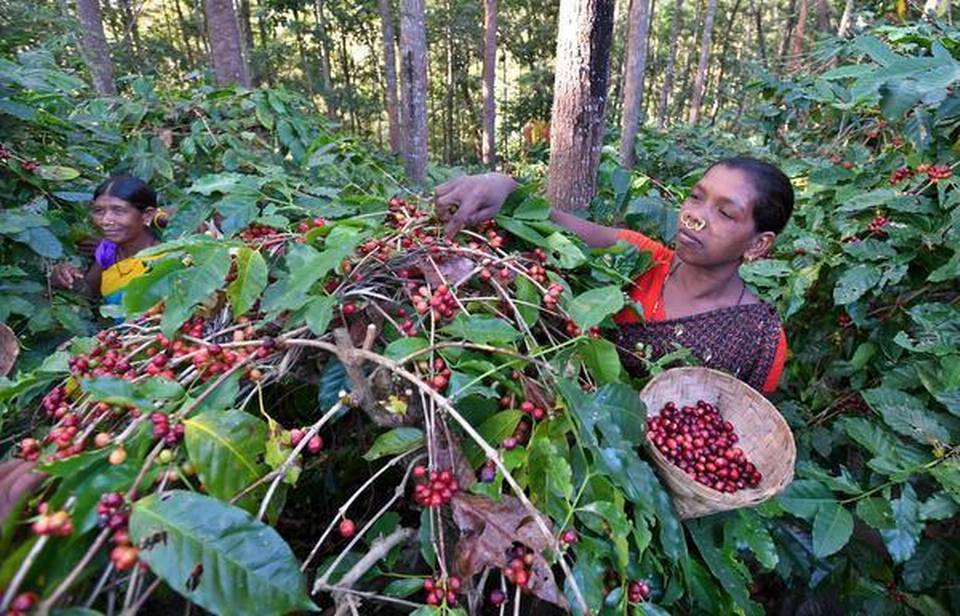It might have been around for a century, but Araku’s Arabica coffee didn’t get the tag that easily
Araku Valley, the highlands of the Eastern Ghats mountain range overlooking the Bay of Bengal, is brewing one of the best coffees in the world and its aroma just got headier with the Geographical Indication (GI) tag it was recently awarded.
Located 2,985 feet above sea level, coffee plantations here are spread across hilly terrain growing under the shade of towering silver oaks. What makes this coffee unique is that it is organic and cultivated by Adivasi farmers in 10 mandals of the region. The peculiar mix of climate in Araku — hot days and cool nights — coupled with naturally iron-rich soil lends the Araku coffee body, intensity and a rich aroma. No wonder it has fans across France, Sweden, Dubai and Switzerland as well.
Interestingly, the Girijan Cooperative Corporation (GCC), which has been promoting Araku coffee for three years now, had applied for the GI tag at the Chennai-GI registry in 2016. However, its claims at that time were dismissed by the Coffee Board of India, an organisation managed by the Ministry of Commerce and Industry.
___________________
Coffee Statistics
- In India, coffee is cultivated on approximately 4.54 lakh hectares
- There are nearly 3.66 lakh coffee farmers (according to government figures, 98 % are small farmers)
- In 2018-19 Coffee production in India is estimated to be 3,19,500 tonnes (according to Coffee Board).
- There has been a rise of 13.26 % in the first two months of this year, totalling to to 48,330 tonnes
___________________
Things changed, however, when the Coffee Board itself applied this year; the Chennai-based GI registry awarded the GI tag to Araku, along with four others (Coorg Arabica coffee from Karnataka, Wayanad Robusta coffee from Kerala, Chikmagalur Arabica from Karnataka and Bababudangiris Arabica coffee also from Karnataka).
“The GI tag will help Indian coffee varieties be specifically identified with their unique flavour and also increase their popularity. The adivasis of Araku will now get a better price for their produce,” says T Baburao Naidu, GCC vice-chairman and managing director. The GCC is expanding its footprint across the State and the country by setting up outlets selling Araku coffee.
Coffee cultivation in the Araku region began around the early 1900s. But it came into the limelight only a few years ago after a couple of players like GCC and Naandi Foundation (an organisation working in the social sector) entered the fray to help the adivasis grow quality beans and market their produce on the global platform.
_________________
What it means
- A GI is a name or sign used on products which belong to a specific geographical location or origin and is a certification that the product possesses certain qualities that are unique to that locality.
________________
Manoj Kumar, CEO of Naandi Foundation, says, “When I started working in the area as part of Naandi Foundation 20 years ago, people told us this is was a ‘non-traditional’ coffee region! We have come a long way since then, with a strong cooperative of 10,000 adivasi farmers and a central processing unit. We opened a flagship store in Paris, and won the Gold Medal for the best coffee pod at the Prix Epicures OR 2018 Award. The GI tag is a safety net and a recognition that this region’s coffee has a unique identity.”
A loyal Araku coffee fan, Vidya Raghu, says, “It is different. There is an exhilarating aroma, golden-brown froth and a lingering, slightly sharp after-taste that envelopes your senses. I haven’t experienced this kind of refreshing flavour with any other coffee I’ve had.”
source: http://www.thehindu.com / The Hindu / Home> Life & Style>Food / by Nivedita Ganguly / April 11th, 2019
